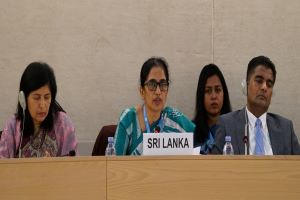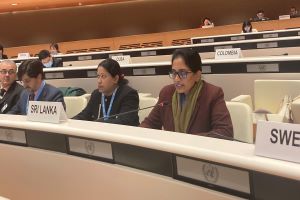
Madam President,
Distinguished delegates,
It is an honour to address this august assembly and to share my country’s perspectives on the work of the Conference on Disarmament, at a time the world is facing myriad of security threats which are at the core of issues discussed at the CD for decades, primarily the threat of nuclear escalation. Other current global security challenges such as transnational organized crime, terrorism, advanced weapon delivery systems add to the dangers associated with the existence of WMD. The situation has heightened the need for progress in global disarmament and the non-proliferation regime which remains the primary purpose of this Conference.
Madam President,
The times are difficult, and our responses require swift action with a sense of collective responsibility, conviction and firm determination. We are deeply concerned about our collective failure to reach a consensus outcome at the 10th Nuclear Non-Proliferation Treaty (NPT) Review Conference, a missed opportunity indeed given our increased vulnerabilities and growing nuclear threats. The implementation of disarmament commitments and obligations have stalled to a great extent, while the expansion and modernization of nuclear arsenals, and the introduction of advanced nuclear weapons continue to take place. We emphasize the equal importance of the three pillars of the NPT; nonproliferation, disarmament, and peaceful uses of nuclear energy and urge for meaningful dialogue to find possible convergence building on our work during the last review conference. Sri Lanka remains committed to the goal of a world free of nuclear weapons, the only guarantee against their proliferation.

Mr. President,
Let me thank you and your team for convening this meeting [thank the panelists] on this very important topic on negative security assurances.
Mr. President, let reiterate at the outset that total elimination of nuclear weapons is the only guarantee against the use or threat of use of nuclear weapons. As stated in our previous statement to this Conference in January this year, we attach utmost priority to the goal of complete and verifiable elimination of nuclear weapons. Negative Security Assurances (NSAs), while it is commonly agreed as an essential legitimate interest of non-nuclear weapon states, is only an interim measure pending the achievement of a world free of nuclear weapons.
Final document of the 1978 First Special Session on Disarmament obliges nuclear-weapon states to “pursue efforts to conclude, as appropriate, effective arrangements to assure non-nuclear-weapon States against the use or threat of use of nuclear weapons”. The topic of NSAs has been in the agenda of the CD since its inception of 1979. We also note the UN Security Council resolution 984 adopted unanimously in 1995 providing pledges on NSAs to nonnuclear-weapon States parties of the NPT in the context of obtaining an indefinite extension of the NPT. Furthermore, the consensus Action Plan of the 2010 NPT Review Conference refers to action points 8 and 9 on NSAs. However, despite discussions that have been continuing in the CD in various forms over the years, we have not been able to conclude a legally binding instrument to effectively assure non-nuclear-weapon States (NNWS) against the use or threat of use of nuclear weapons.
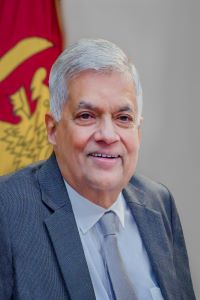
Independence Day Message
Our 75th Anniversary of Independence from colonial rule is being observed during an extremely critical and challenging time in the country. It is, indeed, a decisive moment. However it presents an opportunity for us not only to review our strengths and gains as a nation but also to rectify our errors and failures.
Since 1948, we have, as a nation, undergone many tests and travails - from riots, insurgencies and war to natural disasters. These experiences have left us with a sense of inculcated resilience that has made us revive better when faced with adversity. Therefore, I am confident that even at this juncture we will pool our energies as the daughters and sons of one mother to rise up from the current economic abyss and build back stronger.
There is a new economic and social reform agenda before the country with the objectives focusing first on recovery and then on renewed development. It is imperative for us to unite in its implementation so that we can emerge with a high level of economic prosperity. I pledge today to make the extremely difficult though vital decisions to achieve this goal with courage and determination. I anticipate the confidence and support of you, the people of our country, in this
endeavour.
I also take the opportunity to thank you, the Sri Lankan expatriate community, for your contribution towards the development of our motherland despite your distance. I would like to invite you to join us in securing a bright future for the younger generation of Sri Lankans who are at the vanguard of economic and social development. Your faith and investment in the unique and creative ideas of our talented youth who lack capital could give considerable hope and be of
immense benefit to our country in this crisis.
On this historic anniversary, let us all resolve to meet the challenges of this year with further patience and fortitude.
I extend warm felicitations to you, Sri Lankans, here and aboard.
Ranil Wickremesinghe
President
Democratic Socialist Republic of Sri Lanka
04 th February 2023
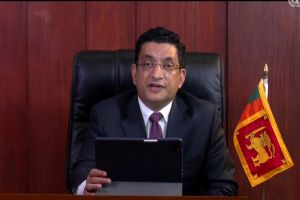
Sri Lanka concluded its 4th Cycle of the Universal Periodic Review (UPR) during the 42nd Session of the UPR Working Group on Wednesday 1st February in Geneva. Sri Lanka’s National Report was prepared by the Ministry of Foreign Affairs with input from government ministries and agencies through an inclusive and broad-based process where civil society organizations and the National Human Rights Commission of Sri Lanka were also consulted.
The UPR is conducted as a review mechanism by the UPR Working Group of the UN Human Rights Council in four year cycles. Sri Lanka’s last UPR review was in 2017.
Delivering the opening statement via a pre-recorded statement, the Head of Delegation, Foreign Minister Ali Sabry highlighted the progress and achievements made by Sri Lanka since its last review including the implementation of the recommendations accepted. Sri Lanka envisages 2023, the 75th anniversary of independence, to be a year of socio-economic stabilization, reconciliation, and recovery. The Minister also said that “it is important to learn from the past, and it is equally important to move on, to build better and stronger.”
The Permanent Representative to the UN in Geneva Ambassador Himalee Arunatilaka highlighted legislative and policy measures implemented by Sri Lanka during the reporting period including the 21st Amendment to the Constitution, strengthening efforts on the reconciliation processes and the national independent institutions.

Sri Lanka concluded its Review under the 4th Cycle of the Universal Periodic Review (UPR) in Geneva, today.
Foreign Minister Ali Sabry, as the leader of the Sri Lanka delegation, delivered the remarks through a pre-recorded video statement.
Ministry of Foreign Affairs
Colombo
1 February, 2023
.....................................
Pre-recorded video statement by the Hon. Minister of Foreign Affairs Fourth Cycle of the Universal Periodic Review of Sri Lanka
Geneva, 1 February 2023
Mr. President,
Excellencies,
Distinguished delegates,
It is a privilege for me to welcome all of you to Sri Lanka’s Review under the fourth cycle of the Universal Periodic Review.
The year 2023 is a milestone for the global human rights architecture. We are celebrating the 75th anniversary of the Universal Declaration of Human Rights and also the 30th anniversary of the Vienna Declaration and Programme of Action. The mechanism of the UPR marks the culmination of a long review process of the international human rights machinery. We value the fact that this mechanism provides an equal opportunity for all UN member States, without discrimination, to voluntarily share the progress made domestically to promote and protect human rights. This peer review process has contributed to reducing selectivity and politicization in our efforts to advance the cause of human rights. It enables constructive engagement on developments related to human rights with our international partners, national independent institutions, civil society, and the UN system.
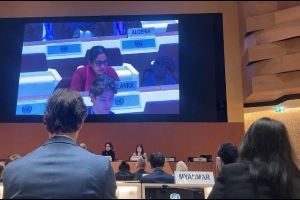
Mr President,
[I thank you Mr. President, for your kind words of welcome.]
Sri Lanka congratulates Egypt and you, Ambassador Ahmed Gamaleldin, on assuming the first Presidency of the 2023 session of the Conference on Disarmament. My delegation assures you and other P6 Presidencies of our full support and cooperation to find common ground for fulfilling CD’s obligations towards strengthening international peace and security. We also thank the Secretary General and the CD Secretariat for their continuous support.
I have the honour to make a statement at the plenary of this august Conference following my assumption of duties as the Permanent Representative of Sri Lanka to the UN in Geneva earlier this month. It is a pleasure to be back in the Conference on Disarmament after 20 years; however it is sad to see that the CD is still going through excessive institutional pain year after year with no real progress on fulfilling its negotiating mandate. I look forward to working with all delegations in a spirit of cooperation and wish to reiterate our position that only through confidence building and equal respect for the security of all Member States that we will be able to achieve the much-needed consensus towards adopting a programme of work.
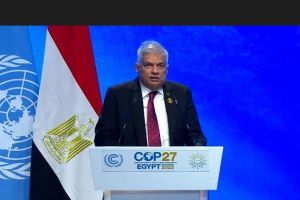
President Ranil Wickremesinghe addressing the COP 27 Climate Change Conference in Sharm El-Sheikh, Egypt said that unbridled industrialization of the developed countries is the root cause of climate change, leaving the poor to suffer the consequences. He said that the problems facing poor countries are augmented due to the absence of adequate funding.
As a result, these countries are facing double jeopardy – struggling to develop economically while fighting to protect the living standards of their populations.
Therefore, President Wickremesinghe said that the developed countries must deliver on their pledge in Glasgow – by doubling their funding to compensate the developing countries for loss and damage.
- Sri Lanka rejects resolution at the UN Human Rights Council
- Statement by the Minister of Foreign Affairs of Sri Lanka at the 51st Regular Session of the United Nations Human Rights Council in Geneva on 12 September 2022
- Tenth Meeting of States Parties to the Convention on Cluster Munitions (10MSP) 30 August to 2 September 2022

